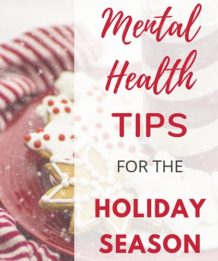The holiday season is a wonderful time of year. At RISE Housing and Support Services, we love to celebrate and make the holidays special for our residents, clients, and our staff. At the same time, we are mindful that for individuals with a mental health diagnosis or a substance use disorders, the holiday season can be stressful, emotionally isolating, and overwhelming. To manage these types of feelings during the holiday season, it is important to know what your triggers and stressors are in order to plan ahead.

Triggers are things that are reminders of past trauma and cause the feelings and emotions associated with that trauma. Stressors are things that cause an immediate state of stress, strain or tension. Stress is a high-risk factor for people managing mental health issues or recovering from substance use disorders. Stress can happen to anyone, but when people with mental health or substance use issues experience it, the stress is amplified. Recognizing your triggers and stressors and knowing how to manage them is important in order to successfully manage the holiday season and avoid negative feelings and cravings for substances.
Financial struggles, family problems, and general stress are often increased during the holidays. Other common triggers are holiday shopping, especially when there are large crowds, and attendance at parties and events, especially where drugs and alcohol are present. Long-held family traditions that center around alcohol, dealing with difficult relatives, unwanted family or work obligations are often triggers that cannot be avoided. Also, time constraints, busier schedules, traveling, returning to hometowns and childhood homes, reminiscing about past joyous holidays, and pressure to host the “perfect” party, or prepare the perfect meal can trigger unwanted feelings or emotions.
Avoiding triggers can be tough, but with planning and preparation, they can be managed. Being prepared is one of the best ways to help avoid triggers and stressors. Plan visits with family carefully; have an exit plan so that you can leave early if needed. For those who have substance abuse disorders, attending extra self-help meetings may be a good idea. Reach out to social and sober supports. Rehearsing responses a head of time can help as well. Have an excuse ready when offered drinks or drugs can deter addictive behaviors. Sometimes, being open about your recovery can cause people to support you and not add to the problem but try to avoid people who might otherwise tease or pressure you about not drinking alcohol.
Being mindful is a good strategy to avoid triggers and stressors. Assess and evaluate the holiday activities you are invited to attend. Knowing your triggers and stressors is crucial. A helpful hint this holiday season is to remember HALT: Hungry, Angry, Lonely, Tired. These are the most common triggers that can bring on stress, anxiety, depression, or cravings for alcohol and other substances. Taking care of yourself mentally and physically, utilizing supports, and using your coping skills works best to manage and mitigate the “holiday blues.”
We thank our 2020 Undergrad Intern, Elena Lamb, for her contribution towards this blog.
